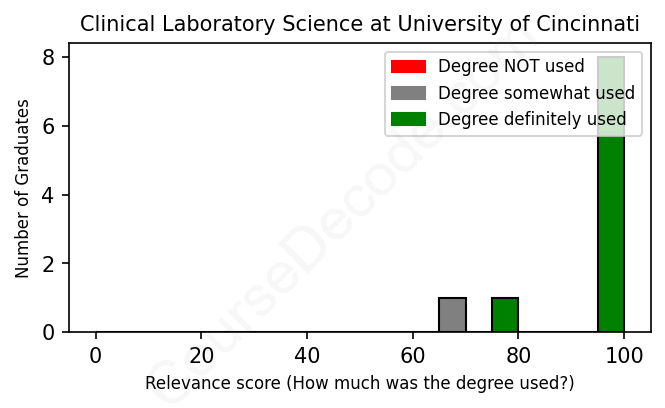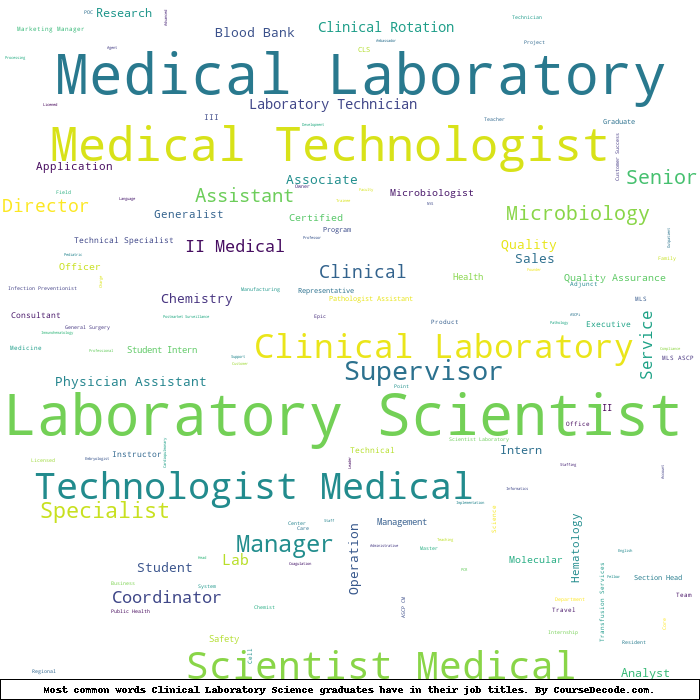
First, some facts. Of the Clinical Laboratory Science graduates from University of Cincinnati we've analyzed , here's how many have used (or NOT used) their degree in their career:

These are estimates based on AI analysis of 10 LinkedIn profiles (see below).
The verdict? Great! Overall, with an average relevance score of 93%, Clinical Laboratory Science graduates from University of Cincinnati have a substantially higher likelihood (+26%) of finding work in this field compared to the average graduate across all fields:
And for comparison, here's the chart for all profiles we've looked at across all degrees.
Also, after graduating, only 30% of these graduates have pursued further education other than another Bachelor's degree (such as a Masters degree or other), compared to the average across all profiles of 35%. This suggests a Bachelors degree is enough for most Clinical Laboratory Science graduates, and it's normal to look for work straight after graduation.
See the details:
|
Relevance score: 96% We think this person has gone into a career highly relevant to their degree. We think this person has gone into a career highly relevant to their degree.
DEGREE INFOGraduated in 2012 from University of Cincinnati with a Bachelor of Applied Science (B.A.Sc.) in Clinical Laboratory Science. No other secondary education since. JOB HISTORY SINCE GRADUATIONMedical Laboratory Technologist Community Medical Services Feb 2019 - Aug 2022 Senior Medical Laboratory Scientist  LabCorp 2013 - 2023 Laboratory Quality Coordinator  Gila River Health Care Jul 2023 - Present ABOUTNo information provided. |
The top 10 most common jobs done by the graduates we've analyzed (ranked most common to least) are:
After analyzing the job histories of graduates from the University of Cincinnati with a degree in Clinical Laboratory Science, it’s clear that many of them have pursued positions that are very relevant to their studies. A significant number have become Medical Technologists or Medical Laboratory Scientists, which directly relate to the skills and knowledge they gained during their degree. Roles in hospital settings, such as hematology team leaders and lab directors, show that graduates not only start off in technical roles but often advance into leadership positions where they oversee laboratory operations. This suggests a well-laid path from education to employment that capitalizes on their clinical laboratory science education.
However, it's interesting to note that some graduates have ventured into less directly related roles. Positions like director of outpatient services or account executive in sales tend to stray from the laboratory-focused education they received. These jobs might have some overlap with clinical knowledge, but they focus more on management or sales, which don’t utilize laboratory science expertise on a daily basis. Overall, while most graduates stick closely to roles in clinical laboratory settings, there's a noticeable mix with professional paths that diverge from their core education, illustrating the diverse opportunities available to them after graduation.
Here is a visual representation of the most common words in job titles for Clinical Laboratory Science graduates (this is across all Clinical Laboratory Science graduates we've analyzed, not just those who went to University of Cincinnati):

Based on the LinkedIn profiles of graduates from the University of Cincinnati with a degree in Clinical Laboratory Science, it seems like many of them have started their careers in solid positions directly related to their field. Typically, their first jobs after graduation have been as Medical Technologists or Medical Laboratory Technicians, which are foundational roles in clinical laboratory settings. These initial roles often lead to upward mobility within a few years, transitioning into supervisory or managerial positions. For example, many alumni have progressed to roles such as Regional Laboratory Directors or Laboratory Managers, indicating a career path that values experience and expertise built over time.
Looking five to ten years down the road, graduates often occupy leadership roles within their organizations, such as Directors of Laboratory Services or Outpatient Services. Some have even ventured into related fields, like sales within healthcare companies, although this seems less common. Overall, the data suggests that graduates of this program have found meaningful and successful careers in the healthcare field, closely aligned with clinical laboratory science. It appears that pursuing this degree has led to positive career trajectories for many, providing a robust foundation for both immediate job placement and long-term career advancement.
Honestly, a Bachelor’s degree in Clinical Laboratory Science can be pretty challenging, but it really depends on your interests and strengths. The coursework usually involves a mix of biology, chemistry, and specialized lab techniques, which can be pretty intense if you’re not super into the sciences. At the University of Cincinnati, students generally find that the program is rigorous but manageable, especially if you stay organized and get help when you need it. It’s definitely not a walk in the park, but if you like the subject matter and are willing to put in the effort, you can definitely make it through!
Most commonly, in the LinkedIn profiles we've looked at, it takes people 2 years to finish a Bachelor degree in Clinical Laboratory Science.
So, looking at these grads from the University of Cincinnati, it seems like many of them have climbed the career ladder pretty well, especially those who landed positions like Director or Regional Laboratory Director. Those higher-level roles often come with decent salaries, so I’d say it looks like they’re making some good money overall. The ones who stayed in more entry-level positions, like Medical Technologist or Medical Laboratory Technician, might not be raking in the big bucks, but they still have steady jobs in a field that's crucial and always in demand. With a mix of roles and career advancements here, many of them are likely doing just fine financially!
Here is a visual representation of the most common words seen in the "about" section of LinkedIn profiles who have a Bachelor degree in Clinical Laboratory Science (this is across all Clinical Laboratory Science graduates we've analyzed, not just those who went to University of Cincinnati). This may or may not be useful:

Here are all colleges offering a Bachelor degree in Clinical Laboratory Science (ordered by the average relevance score of their Clinical Laboratory Science graduates, best to worst) where we have analyzed at least 10 of their graduates:
| College | Score | Count |
|---|---|---|
 University of Cincinnati University of Cincinnati
|
93 | 10 |